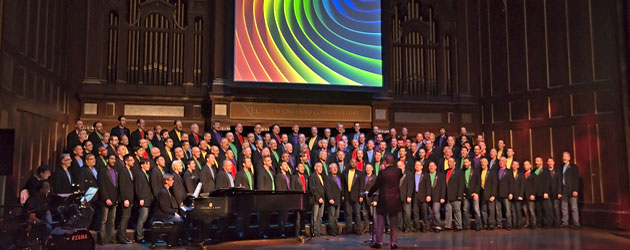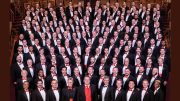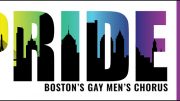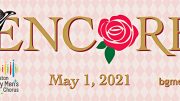With elves in sequins, polka dancers, and fresh takes on holiday classics, Noel is sure to entertain
Courtesy of the Boston Gay Men’s Chorus—
It’s the most wonderful time of the year―time, that is, for the Boston Gay Men’s Chorus’s (BGMC) annual holiday extravaganza. With Noel BGMC combines traditional favorites like “Deck the Hall” and “The First Noel” with fun new classics like “Sparklejollytwinklejingley” from the Broadway musical Elf. Musical director Reuben Reynolds III promises it’ll be BGMC’s most theatrical production yet and “unlike any concert you have ever seen.” There will be polka dancers and sequined elves as BGMC decks Jordan Hall at the New England Conservatory with boughs of holly, wreaths and red ribbons―and glitter. Read on to learn more from Reynolds about Noel.
Q: You’ve promised that Noel is going to be unlike any concert we’ve ever seen. How is it going to be different than BGMC’s past holiday concerts?
A: There will be a lot more use of lighting and theatricality. During the opening number “Deck the Hall” we’re actually going to deck the hall. Instead of just walking around and singing, we’ll stage the opening number by hanging wreaths and bows and decorating for Christmas. It’s going to be done traditionally with real bows and big wreaths and that kind of thing, and at the opening of Act Two we’re going to do a number from the Broadway musical Elf, called “Sparklejollytwinklejingley.” And the first line says, “If you want to deck the halls for Mr. Claus, you’ve got to remember to do it Sparklejollytwinklejingley,” so we’re going to gay it up. Oh, and I should tell you: the number has a group of dancing elves who decided the decoration that we did at the beginning wasn’t enough, and because they’re decorating for Mr. C, they need to make it really flashy. And they do: they come on in these red sequin coats that just blind you, and they really toss the glitter! [pullquote]And the first line says, “If you want to deck the halls for Mr. Claus, you’ve got to remember to do it Sparklejollytwinklejingley,” so we’re going to gay it up.[/pullquote]
Q: Everything’s better with glitter! But before we get to that, tell me about some of the traditional music you’ll be performing.
A: We’ll start with two traditional pieces in Latin, after we open with “Deck the Hall.” The first is “Ave Maria,” which everybody knows and associates with Christmas, I think. And then “Festival Gloria,” which is a huge way of showing off the chorus and what it does best, just standing and singing. We’ll also sing “The First Noel,” which is where the concert’s name comes from.
Also, because we’re traveling to the Middle East in 2015, we’ve been thinking a lot about peace during this Christmas time, and what the things are that bring us peace. So we’ll sing “Let There Be Peace on Earth,” and “Someday at Christmas.” We’ll honor what the season is really about: not just buying things for each other, but changing the world. And creating peace for ourselves here on earth.
Q: You’re also featuring the music of a contemporary Norwegian composer Ola Gjeilo, who moved to the U.S. in 2001 to study at Julliard.
A: We have two pieces by Ola. One is called “The Ground,” and it’s from a piece called The Sunrise Mass, which is a long piece where he starts in Heaven, and he describes the heavens, and he comes to Earth, and he describes what it is like to live on Earth, both in the mountains and in a busy, bustling city. “The Ground” is the last part and Ola uses the words of the Mass to paint a picture of what it is like to be a part of the earth, to be a part of the firmament, and to actually go to the ground and become part of the earth itself, which is probably a little bit esoteric to be reading about in a newspaper, but it will all make sense at the concert!
Ola has also written a brand-new piece that we co-commissioned, and it’s called “A New Year’s Carol.” It’s wonderful. It’s about the seasons repeating themselves, and the wheel of the year that keeps turning, and how we have to become part of this growth that happens as the seasons keep turning. In winter, the world is buried in snow, but pretty soon the sprouts of growth will be peeking out, and spring will be on its way again, and the year continues. And I love this metaphor of us becoming a part of that cycle—that the wheel of the year keeps turning, and we keep growing with it. And soon spring will be back, and then next year will come again the snows, and we will repeat that cycle.
Q: You said earlier that you’re going to gay it up in Act II, starting with the song from Elf. Act II also includes a group of songs called “What If” carols. What are those and what’s so gay about them?
A: The “What-If” carols are five Christmas carols that we kind of re-imagine as if different composers had written them. We makeover the holidays from a gay perspective. So, the first one is “What if Stephen Sondheim had written ‘Santa Claus is Coming to Town’?” It’s a takeoff of “The Ballad of Sweeney Todd” that’s just hilarious. The second one becomes, “What if Philip Glass had written ‘Silent Night’?” So, it’s a takeoff on Philip Glass’s music, which is the start of minimalism, and Martha Graham dance.
The third one is “What if Lawrence Welk had written ‘Away in a Manger’?” It becomes the Manger Polka, so of course, we have to have polka dancers. The fourth one is, “What if Kander and Ebb, who wrote Cabaret and all that kind of stuff, had written ‘I Saw Mommy Kissing Santa Claus’?” Well, it becomes a version of “I Saw Daddy Kissing Santa Claus.” It’s a little bit on the racier side for the kids—“taking a ride on a long white beard of hair,” and it’s really a scream. The last one is “What if Jerry Herman, who wrote Mame, had written ‘We Three Kings’?” Well, it turns it into “We Three Queens,” and the costumes for it are fantastic. “We’re three kings who follow a star up in the sky”―it’s a big show tune. This is one of the funniest sets we’ve ever done in all of our holiday concerts. We have a costumer, Stacy Stevens, who actually works on Les Miserables in New York, and is creating these incredible costumes for us.
Q: Michelle Chassé, the Chorus’s longtime choreographer, also worked on this concert. I don’t think many people associate a choreographer with a huge chorus of 200 guys.
A: Michelle is one of my best friends. She actually is the head of the Musical Theater Dance Program at Boston Conservatory, and she’s been working with the guys for about 10 years. And it’s been incredible to see the growth in them as dancers over the years, because she comes in, and she really works them. She does almost an entire dance class with them. They have to audition for her every year and she picks a group to work with. And during Wednesday rehearsals, and then again on Sunday afternoons, for another three hours, while we’re rehearsing singing downstairs, they’re upstairs doing dance rehearsals. Michelle has an incredible background; she trained with the New York City Ballet.
Q: What other pieces will showcase what you said the chorus does best―just standing and singing?
A: We have a wonderful carol called “This Christmastide” that was written in one day for the opera singer Jessye Norman. She was at a party with Donald Fraser, the composer, and she asked him if he would write something new for a holiday music concert she was going to be singing in. They were at a cocktail party, and he sat down wrote her the chorus of this song on a napkin. It’s absolutely gorgeous. I mean, we have almost 200 men singing this year―it’s 200 men with one harp player―and it just gives me chills.
One other thing I want to say, every October we go for a fall retreat. We do four hours on Friday―after the guys get off work, they come up and rehearse; then we rehearse for eight hours on Saturday and four more hours on Sunday morning. And one of our members who has been with the chorus since its second year told me that he actually stopped and started crying when we were rehearsing this song because it sounded so good. He said the addition of so many younger men to the Chorus makes him kind of feel like a proud grandpa, but it’s also improved the sound of the Chorus. And he’s right, we sound amazing!
Q: It’s great to hear that young gay men are still seeking out gay spaces, even though the broader culture and society has become so much accepting.
A: Something is happening in the chorus. We have so many younger guys who are joining us that it’s a new energy that we haven’t had in ages. We sang through the entire concert, and many of the guys already had it memorized, every bit in its entirety. It’s just—the energy in the chorus right now is stunning. Our ticket sales are running 20 percent ahead of last year. Everything is just going wonderfully.
Q: Now, how do you end a holiday concert that’s equal parts traditional and contemporary?
A: We close the whole concert with a group of carols by Chad Weirck, our accompanist. He’s taken some traditional Christmas carols―“Good Christian Men,” “Hark, the Herald Angels Sing,” “Ding, Dong, Merrily on High,” and “Go Tell it on the Mountain,” and arranged a suite of carols for the men’s voices, for string players, percussionists, piano, harp—basically all the instruments. It’s a huge, splashy, Technicolor ending to the whole thing, where Michelle has the entire chorus dance all over the stage, doing a wild kind of dance. It’s very, very alien in a way—it’s just a huge finale to the whole concert that will leave you so in the mood to go celebrate the holidays. I mean, talk about a big toe-tapping dance finale; this is it!
Q: This sounds like a lot fun!
A: Oh, it’s a blast. It’s the whole feel of all the other holiday traditions for people who don’t want just the same old traditional experience. We want to give them something new and different, and they will have it at this concert.
Performances of Noel take place Sun. Dec. 14 at 3 p.m. and Fri., Sat., and Sun, Dec. 19-21 at 8 p.m. at New England Conservatory’s Jordan Hall, 30 Gainsborough St., Boston. Tickets $20-$60. Visit www.bgmc.org or call 617-542-SING (7464).
[From a News Release]








